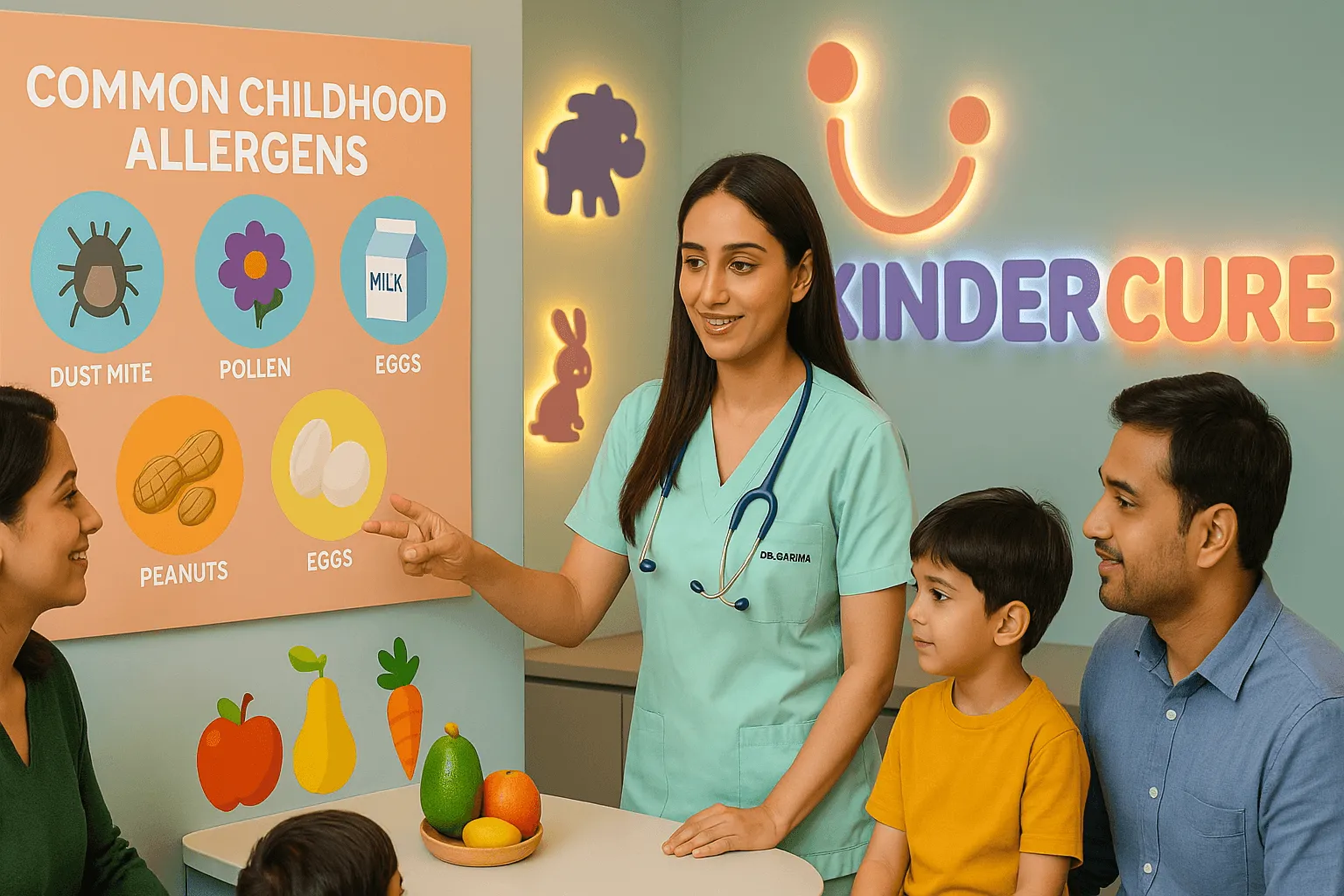Common Childhood Allergies in India: Identification, Prevention and Management

Allergies are among the most prevalent chronic conditions affecting children worldwide and India is no exception [1]. From allergic rhinitis and dust mite allergies to food sensitivities, these conditions can have a significant impact on a child’s daily life if not identified and managed early. At KinderCure, we believe in a proactive and personalised approach that empowers parents to recognise symptoms promptly, seek timely treatment and ensure their children enjoy a healthy, carefree childhood.
A Parent’s Perspective
A recent story from one of our patients, Priya(name changed), vividly demonstrates the importance of early detection. Priya’s four-year-old son, Aarav(name changed), regularly experienced nasal congestion, sneezing and itchy, watery eyes. Initially, they were dismissed as “the common cold.” However, after persistent symptoms, Priya decided to visit us at KinderCure. Under the guidance of Dr. Garima Mengi, often regarded as the best paediatrician in Gurgaon, a comprehensive allergy test was carried out. The diagnosis: dust mite allergy. With the right medication and minor adjustments to Aarav’s living environment, his quality of life improved dramatically.
Why Are Childhood Allergies on the Rise?
In India, rapid urbanisation, increased pollution and lifestyle changes are believed to be key contributors to the rising incidence of childhood allergies [2]. Our environment has a direct impact on children’s developing immune systems, making them more susceptible to allergens such as pollen, dust mites, pet dander or certain foods (like nuts and dairy).
Identifying Symptoms Early
At KinderCure, we encourage parents to stay vigilant. Common allergic symptoms include:
- Frequent sneezing, runny or blocked nose
- Itchy, watery or swollen eyes
- Rashes, hives or dryness on the skin
- Wheezing, coughing or shortness of breath
- Upset stomach, vomiting or diarrhoea (in the case of food allergies)
If your child presents any of these symptoms that last beyond a typical cold cycle, it is best to consult a paediatrician promptly. Early diagnosis can make a crucial difference in preventing complications like asthma or eczema. While allergies can cause respiratory symptoms, it's important to distinguish them from common colds. Learn more about cough and cold treatment to understand the difference and when to seek care.
Prevention and Management
- Allergen Control:
Regular cleaning of the house, using air purifiers and washing bedding in hot water can minimise dust mites. If pollen is an issue, keep windows closed during high-pollen seasons. - Dietary Caution:
Food allergies can range from mild to severe. Watch for any immediate reactions following a new food and consult us for diagnostic tests if you suspect an allergy. - Medication and Immunotherapy:
We at KinderCure provide individualised treatment plans, which may include antihistamines, nasal sprays or other interventions based on the severity of your child’s condition. In some cases, immunotherapy (allergy shots) can be considered for long-term relief [3]. - Lifestyle Adjustments:
Encouraging children to maintain a balanced diet, engage in physical activities and adhere to regular check-ups is essential. Small changes in routine can significantly reduce allergy flare-ups.
The Importance of Regular Check-ups
“Regular follow-ups help us stay a step ahead of any potential complications,” says Dr. Garima Mengi, often praised as the best paediatrician near me in Gurgaon. “We adjust treatment plans based on changes in symptoms, ensuring a child’s overall growth and development remain on track.” Our Services at KinderCure are designed to provide thorough assessments, early diagnosis and continuous support to families navigating childhood allergies.
Seeking Expert Guidance
If your child is exhibiting any persistent symptoms, we invite you to book an appointment at KinderCure. Early consultation allows our paediatric team to provide tailored advice and treatments through our comprehensive asthma and allergy management services, ensuring your child’s allergies are managed effectively. Our specialized care includes allergy testing, trigger identification, and personalized treatment plans. For more insights on child health and wellbeing, visit our other blogs.
References
[1] Gupta R, et al. “Allergic Disorders in Children: Changing Trends,” Indian Pediatrics.
Link: https://www.indianpediatrics.net/
[2] Kumar A, Gupta NK, Jain SK, et al. “Prevalence and Patterns of Allergic Rhinitis in Schoolgoing Children in Chandigarh: A Cross-sectional Study,” Cureus, 2022.
[3] Dhami S, et al. “Allergen immunotherapy for allergic rhinoconjunctivitis: A systematic review,” Cochrane Database of Systematic Reviews, 2017.
Disclaimer
This content is for informational purposes only and is not intended as a substitute for professional medical advice, diagnosis, or treatment. Always seek the advice of a qualified paediatrician or other medical practitioner with any questions you may have regarding a medical condition or treatment.
